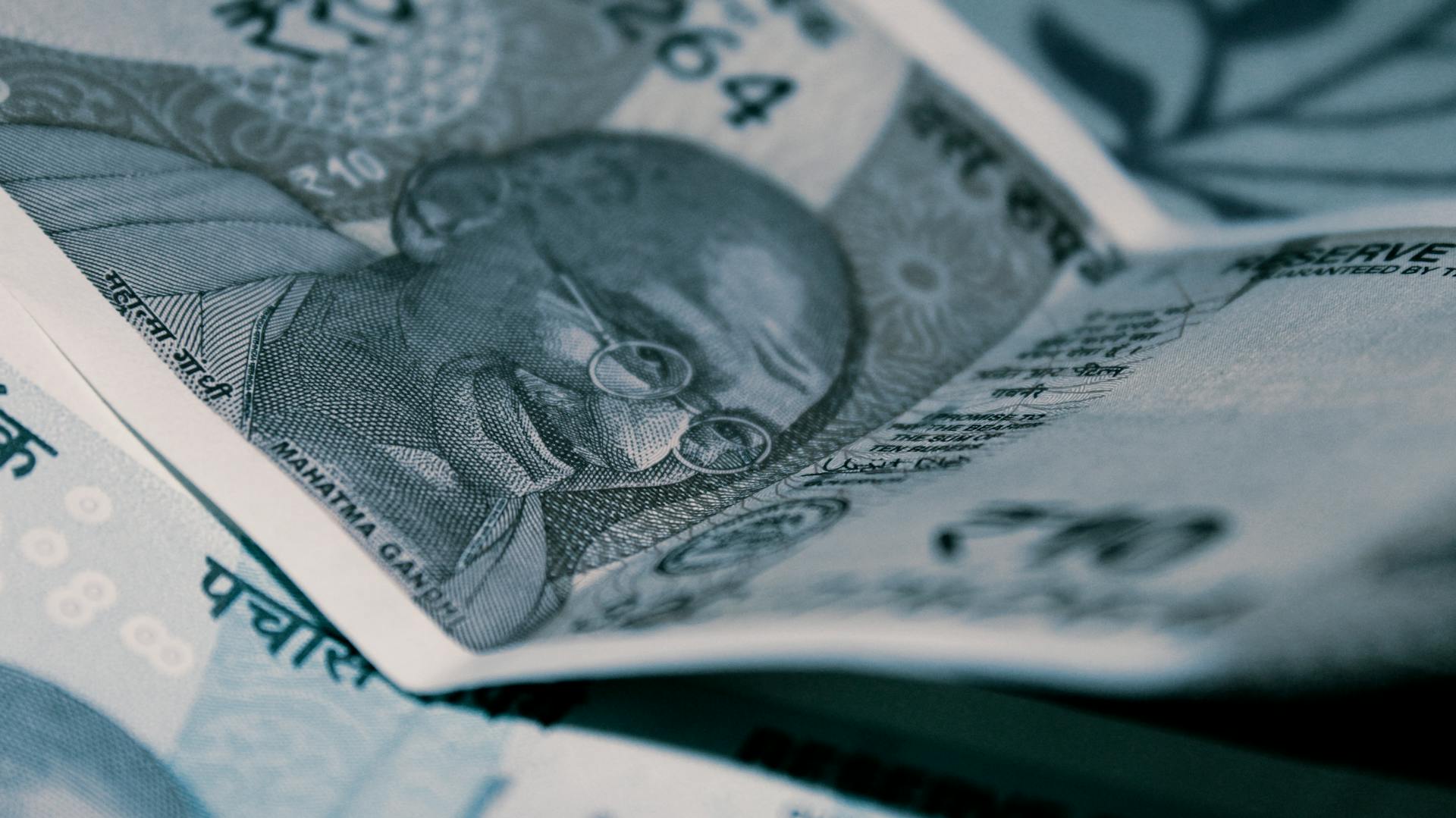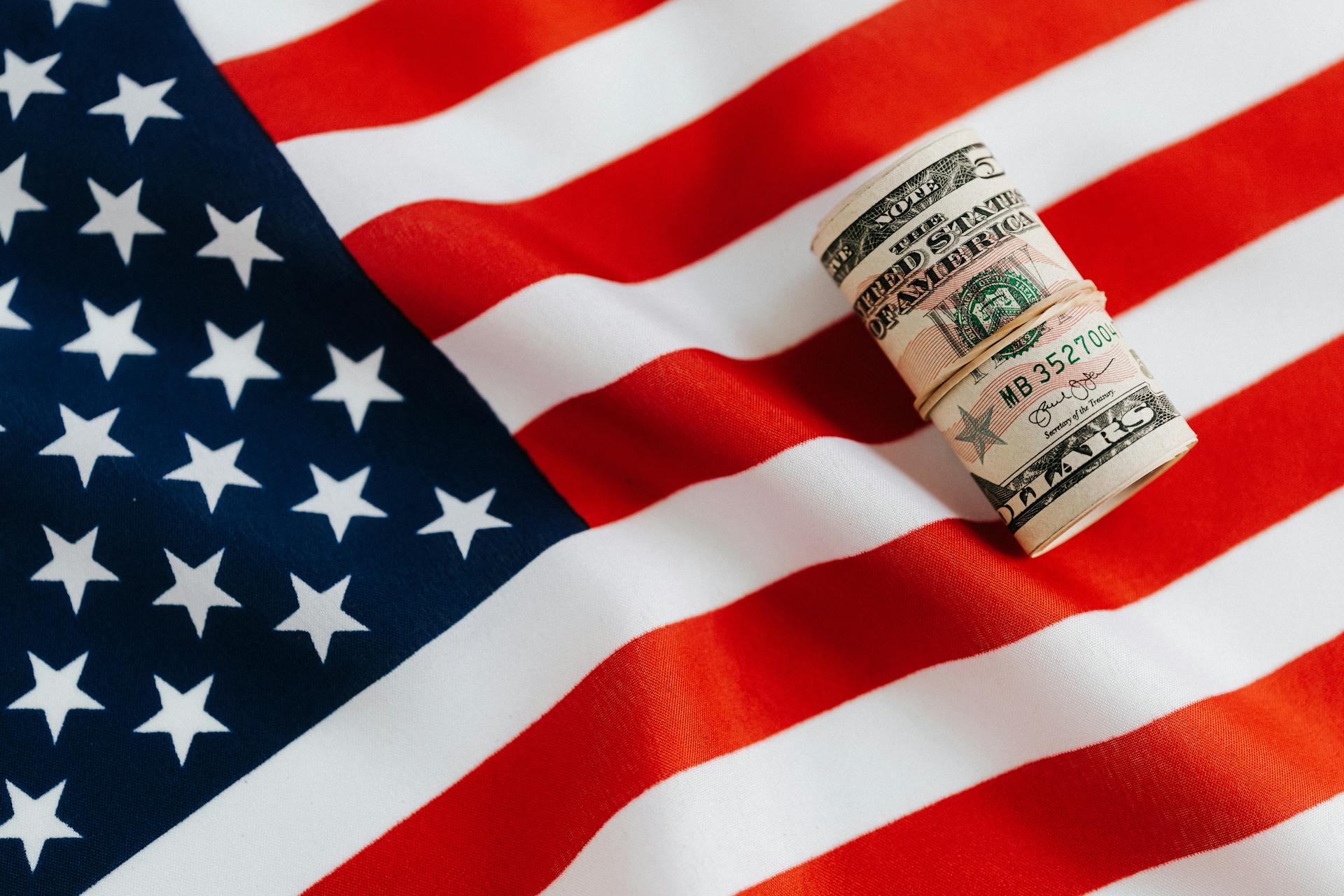
Having a strong or weak currency can have a significant impact on the economy. A strong currency, like the Japanese yen, can make imports cheaper, but it can also make exports more expensive, hurting local businesses.
This is because a strong currency can lead to a decrease in demand for domestic goods. For example, if the yen is strong, it may become more expensive for foreign companies to buy Japanese goods, making them less competitive in the global market.
On the other hand, a weak currency, like the Argentine peso, can make imports more expensive, but it can also boost exports by making them cheaper for foreign buyers. This can lead to an increase in demand for domestic goods.
However, a weak currency can also lead to higher inflation, as imports become more expensive and businesses raise their prices to keep up.
A fresh viewpoint: Lead vs Supervisor vs Manager
Effects of Currency Strength
A strong dollar can make imported goods cheaper for consumers, like electronics and cars, which is a definite perk. This is because a strong dollar can buy more of a foreign country's currency.
A strong dollar can also make international travel more affordable for Americans. For instance, if the exchange rate is 1/1.40 USD/CAD, $1 USD can buy $1.40 CAD, making Canada a more attractive destination.
However, a strong dollar can be a challenge for U.S. companies that sell goods to foreign customers. This is because their goods and services cost more relative to a weaker currency, potentially putting them at a disadvantage in the global market.
In extreme cases, a strong dollar can even lead to job losses in the United States. For example, when the dollar was overvalued in the late 1990s and early 2000s, the manufacturing sector lost 740,000 jobs.
On the other hand, a weak dollar can make U.S. goods more competitive in the global market, potentially boosting economic growth and creating jobs in the manufacturing sector.
Understanding Currency Strength
A strong dollar means the U.S. currency's exchange rate is favorable, allowing you to buy more of a foreign country's goods. This is measured by the exchange rate, for example, 1/1.30 USD/CAD, where $1 USD buys $1.30 CAD.
Expand your knowledge: Norwegian Krone to Canadian Dollar
If the exchange rate changes to 1/1.40 USD/CAD, the U.S. dollar has strengthened and can buy more Canadian currency. This is a good thing for consumers, making imported goods like electronics and cars cheaper.
However, a strong dollar can be bad news for U.S. companies that sell goods to foreign customers, as their products cost more relative to a weaker currency.
For more insights, see: Taux De Change 100 Franc Suisse / Dollar
Factors Determining Currency Strength
Understanding Currency Strength is a complex topic, and one of the key factors is the interest rate of a country. A relatively higher interest rate is attractive to foreign investors seeking a higher rate of return, which in turn increases demand and price for the currency.
The interest rate is a crucial factor in determining a currency's strength. According to Richard Barrington, the primary spokesperson and personal finance expert for MoneyRates.com, a higher interest rate can help promote a stronger currency because it attracts foreign investors who purchase the currency, increasing demand and price.
Discover more: Usd Currency Strength
Economic policies also play a significant role in determining a currency's strength. Fiscal discipline and anti-inflationary monetary policies help keep inflation and debt in check, making a country's currency more attractive to investors.
A strong, well-established government is attractive to investors and promotes a strong currency because investors are more confident in the solidity of the currency. This confidence leads to increased investment and a stronger currency.
Here are the three crucial factors that influence a currency's strength, as identified by Richard Barrington:
- Interest rates
- Economic policies
- Stability
The Dollar's Weakness
A weak dollar means our currency buys less of a foreign country's goods or services, causing prices on imported goods to rise. This can make traveling to the U.S. more expensive, forcing travelers to scale back their vacations.
A weak dollar is also beneficial for emerging markets that need U.S. dollar reserves, as they can afford to purchase U.S. currency more easily. This can help these countries stabilize their economies.
However, a weak dollar can also hurt the U.S. economy by making its goods less competitive in the global market, particularly if a major trading partner like China artificially keeps its currency weak. This can lead to trade wars, where import tariffs are imposed in response to the artificially weak currency.
A weaker dollar means our exports are more competitive in the global market, which can save U.S. jobs. This is a double-edged sword, as it can also make it harder for U.S. manufacturers to compete with cheaper foreign goods.
Here are some key effects of a weak dollar:
- Prices on imported goods rise
- Travelers to the U.S. may need to scale back a vacation
- U.S. exports are more competitive in the global market
- Emerging markets can better afford to purchase U.S. currency
Implications of Currency Strength
A strong currency has its pros and cons. Let's dive into the implications of currency strength.
If the U.S. dollar is strong, American consumers will pay less for imported goods like electronics, cars, and food. This is because a strong dollar makes these items cheaper.
However, a strong dollar also makes it more expensive for foreign countries to buy products made in the U.S., which can lead to a decrease in U.S. exports.
Intriguing read: What Makes a Strong Currency
Implications of a Weaker Dollar
A weaker dollar has both positive and negative implications for the US economy. A weak dollar makes imports from foreign countries more expensive, which can lead to a decrease in consumption of imported goods.
Travelers to the US may need to scale back their vacation plans due to the increased cost of foreign goods. However, a weak dollar also makes US exports more competitive in the global market, potentially saving US jobs in the process.
A weak dollar can be beneficial for emerging markets that need US dollar reserves, as they can afford to purchase US currency more easily. This can lead to an increase in demand for US goods and services.
However, a weak dollar can also lead to trade wars if a large trading partner like China artificially keeps its currency weak, hurting the balance of payments and making it harder for US manufacturers to compete.
Here are some key implications of a weaker dollar:
- Imports from foreign countries become more expensive.
- US exports become more competitive in the global market.
- Emerging markets can afford to purchase US currency more easily.
- US manufacturers may struggle to compete with artificially weak currency of major trading partners.
Implications of a Stronger Dollar
A strong dollar can make your money go further when traveling abroad. For example, when the British pound sterling plunged to a thirty-year low against the U.S. dollar due to Brexit, a dollar could buy more pounds than it could previously.
This means you can buy more for the same amount of money, making you a more powerful consumer. If you vacationed in London that summer, your U.S. dollars stretched further.
The cost of imported goods such as electronics, cars, and food becomes cheaper when the dollar is strong. This is because a strong dollar makes it more expensive for foreign countries to buy products made in the U.S.
However, a strong dollar can also make it cheaper for foreign countries to buy imported goods from other countries, potentially leading to lost U.S. jobs. In the late 1990s and early 2000s, the manufacturing sector lost 740,000 jobs due to an overvalued dollar.
Suggestion: Currency Exchange Buy or Sell Rate
The tech sector tends to have the greatest exposure when the dollar is strong, as many of its sales are outside the U.S. This can make it difficult for U.S. companies to compete in the global market.
A strong dollar can also lead to manufacturers moving plants to foreign countries with lower costs to remain competitive. This can have a negative impact on the U.S. economy and jobs.
Real-World Examples
In 1992, the UK's over-valued Pound led to a recession due to high interest rates and reduced domestic demand. The economy recovered after the Pound left the ERM and interest rates fell.
The UK's experience highlights the challenges of having a strong currency. In 1992, the UK's strong currency led to a recession, while a weak currency can also have its drawbacks.
The UK's experience also shows that a strong currency can lead to problems of overvalued exchange rates.
You might like: Uk Banknotes
Example: 1992
In 1992, the UK's exchange rate was a perfect example of what happens when a currency is overvalued. The Pound was kept in the ERM by increasing interest rates and reducing domestic demand, which led to the recession of 1991/92.

One of the main problems was the currency wars, where countries compete to devalue their currencies and gain a trade advantage.
The UK's economy was severely impacted by the overvalued exchange rate. By leaving the ERM, interest rates fell and the economy was able to recover.
Here are some key facts about the 1992 UK exchange rate crisis:
- Currency wars were a major factor in the crisis.
- The Swiss economy was also affected by the problems of overvalued exchange rates.
- The UK's overvalued exchange rate led to a recession in 1991/92.
Dollar vs Rupee: Winners and Losers
A weak dollar is bad news for tourists and importers, as it makes foreign goods more expensive. The same electronics and cars that used to cost a certain amount in dollars will now cost more.
A strong dollar, on the other hand, is good for consumers who buy imported goods, as they become cheaper. Electronics and cars are suddenly more affordable.
However, a strong dollar can be devastating for U.S. companies that sell goods to foreign customers, as their products become more expensive relative to other currencies. This can lead to manufacturers moving plants to foreign countries with lower costs to remain competitive.
The tech sector is particularly vulnerable to a strong dollar, as many companies like Qualcomm rely heavily on international sales. In fact, over 95% of Qualcomm's sales are outside the U.S.
A strong dollar can also lead to job losses in the U.S. manufacturing sector, as seen in the late 1990s and early 2000s when the dollar was overvalued. During this time, the manufacturing sector lost 740,000 jobs.
It Depends on the Reason
A strong currency can be a blessing or a curse, depending on why it's strong. If a currency is strong because of strong economic fundamentals, the economy can absorb the relative loss in competitiveness.
The opposite is true if a currency appreciates due to speculation. For example, investors seeking a safe haven from economic worries drove up the value of the Swiss Franc, making it overvalued compared to relative purchasing power.
A strong currency can lead to a fall in domestic demand, as we saw in Switzerland. The country's currency appreciation was so fast, it wasn't possible for a successful diversification.
Switzerland did the right thing in limiting the appreciation of their currency. If they had allowed foreign currency traders to continue to pile into the Swiss Franc, the value of the Franc would have become divorced from economic fundamentals.
Here's a simple way to think about it: if a currency is strong due to good economic fundamentals, it's like having a solid foundation. But if it's strong due to speculation, it's like building a house on shaky ground.
In the case of the US, some people believe that the country's strong currency will lead to inflation. However, the data tells a different story: inflation-sensitive long-term US treasury bonds have seen a 20% increase in some funds. This suggests that the relationship between a strong currency and inflation is not always straightforward.
Explore further: Is Us Currency Being Devalued by Inflation
The Bottom Line
A strong currency has its downsides. When the dollar is strong, U.S. goods become more expensive in foreign markets. This can make it harder for domestic companies to compete globally.
A strong dollar also makes imports more affordable, which can be a plus for consumers. However, it can also lead to job losses as companies move out of the U.S. to stay competitive.
Here are some key effects of a strong currency:
- U.S. goods are more expensive in foreign markets.
- Imports are more affordable.
- Global U.S. companies are less competitive.
- Jobs may be lost as companies move out of the U.S. to stay competitive.
On the other hand, a weak currency has its own set of challenges. When the dollar is weak, U.S. goods become less expensive in foreign markets. This can boost exports and create new opportunities for domestic companies.
Frequently Asked Questions
What is an example of a weak currency?
A weak currency is illustrated by the Japanese yen's decline against the U.S. dollar, causing Japanese companies to pay more for dollar-priced raw materials. This leads to increased production costs and higher prices for consumers.
What is a strong currency?
A strong currency is one that holds a higher value than other currencies, making it more valuable for international transactions. This means it can buy more of another country's currency or goods and services.
Sources
- https://courses.lumenlearning.com/suny-macroeconomics/chapter/reading-strengthening-and-weakening-currency-2/
- https://www.bedelfinancial.com/strong-versus-weak-dollar-which-is-better
- https://www.thebalancemoney.com/strong-dollar-or-weak-dollar-which-is-best-3141203
- https://www.economicshelp.org/blog/3457/currency/problems-of-a-strong-currency/
- https://www.moneycontrol.com/news/business/personal-finance/how-does-a-weak-rupee-and-a-strong-dollar-shaping-india-s-economy-12893436.html
Featured Images: pexels.com


